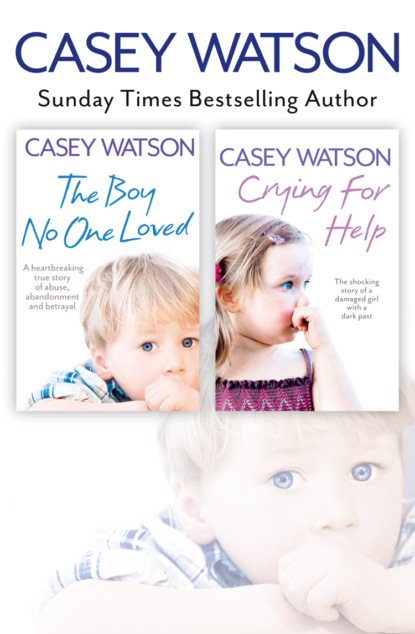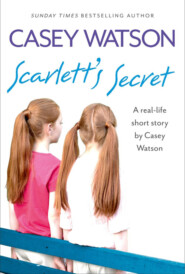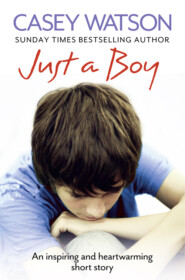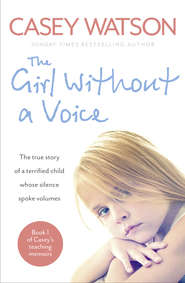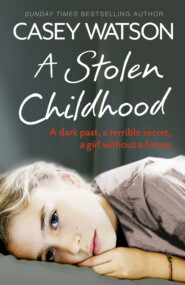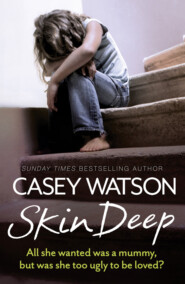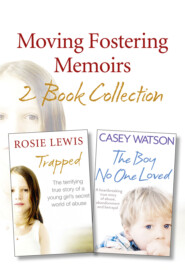По всем вопросам обращайтесь на: info@litportal.ru
(©) 2003-2025.
✖
The Boy No One Loved and Crying for Help 2-in-1 Collection
Настройки чтения
Размер шрифта
Высота строк
Поля
She glanced in my direction. ‘Mum told me. He’s got this thing, apparently. Has this thing about hating women with black hair.’
Kieron glanced at me too, looking shocked. The word ‘hate’ didn’t really exist for him. ‘I know,’ I said, having completely forgotten all about that. Of course! ‘But we’ve also got to remember this is probably a bit too much for him. We have to be patient and give him a chance to settle in.’
Mike got up and began clearing the plates. He was shaking his head as he went out to the kitchen.
While Mike manfully tackled the washing up, I went outside with Riley for a cigarette. I’d been trying to cut down, in preparation for giving up, but right now I really needed a quick nicotine boost. I reassured my daughter that things could only improve; that it would take time, but that once we got to know Justin a little better it would all become easier and less stressful for us all.
She didn’t look convinced – Riley was someone who liked to be liked and I could see that, even though she understood about the black-hair thing, she was still shocked and confused by Justin’s very obvious rejection of her – so I just hoped what I was saying would turn out to be true.
I could still hear plenty of banging and clattering in the kitchen, so I accepted a sneaky second cigarette, feeling the strain of the morning start to ebb away. Justin’s food issues, at least, were something we could definitely address, and as for his thing about black hair – well, I was sure once he got to know us as real people, that would lessen too.
I was just stubbing out the cigarette when Kieron came to the back door to find me.
‘Mum!’ he said, looking shocked. ‘You have to come!’
I started. ‘Come where? What’s the matter?’
‘Dad’s just been up to check on Justin and …’ He seemed completely stuck for words. ‘And his room is … well …’ He frowned at me, looking anxious. ‘Come on. Just come up and see for yourself.’
Chapter 2
I followed Kieron up the stairs, Riley close behind me, wondering what on earth could have happened. We turned the corner of the landing to see Mike standing speechless in the doorway to Justin’s bedroom. He moved out of the way so Riley and I could look into the room.
It was almost unrecognisable, and I really couldn’t take it in. The lovely room I’d so carefully prepared for Justin’s arrival over several days – the place I’d planned so minutely so it would feel welcoming and homely and a safe place of refuge – now looked exactly like a prison cell. There was a long, low cupboard, with some drawers in, under the window, which I had covered with a set of books, a few football figurines, some jigsaw puzzles and a craft box I’d found for him, which contained glue, felt and fabric, sticky paper and gummed stars. Now every one of these items had been hidden out of sight – I couldn’t even work out where he’d put them. The bookcase had been similarly dealt with. I was so shocked, for this had been in some ways the room’s centrepiece; we’d painted it ourselves, in a pattern of red and white blocks, and glued on lots of black and white paper footballs. We’d then filled it with yet more things we thought he’d like – more books, some soft toys, pens and pencils and so on. But it too had now disappeared. He’d covered the whole thing by draping it completely with the blue fleece throw I had bought for the bed. The round football rug had been removed and, I presumed, hidden – I certainly couldn’t see it – and the array of fluffy cushions had disappeared from the bed. He’d also closed the curtains so the room was in darkness, making it feel really gloomy and depressing.
In the middle of all this sat Justin, on the bed. He had his knees pulled up close to his chest, and was playing on a hand-held computer game he had resting against them; one that he’d obviously brought with him. Most compelling about the scene though was that he seemed completely indifferent to us all crowded there, open mouthed, in the doorway, and just carried on playing the game, his face partly obscured by the controller, his fingers flying over the controls.
‘Justin,’ I gasped at him. ‘What have you done to your room, love?’ I waited, but he didn’t answer. Didn’t even look up. ‘Hey, love,’ I persisted. ‘Where’s everything gone?’
Now he calmly moved the console enough so that I could see his whole face. ‘It’s my room, innit?’ he answered coldly. ‘And this is how I like it.’
It was then that I properly noticed that not everything had gone. He might have stripped the room, but there were two notable exceptions. The TV and DVD player hadn’t been banished. So it wasn’t a case of total, self-imposed deprivation, then.
It was that – that one very specific omission from what he’d done – that made me cross. In fact, all at once, it made me really upset. I’d spent hours agonising over that bloody room and days and days shopping for it and decorating it and everything. And for what? Just to have it trashed by this smug-faced, overweight and downright rude eleven-year-old. It made me see red. I wasn’t happy at all.
Mike, perhaps sensing this, placed a hand lightly on my shoulder and ushered me gently back out to the landing, signalling at the same time for Kieron and Riley to go back downstairs. ‘Right, Justin,’ he said mildly, ‘you just come down when you’re ready, okay? Or if you need anything …’
I was even more furious, hearing Mike say that. I marched back down the stairs and stomped into the kitchen, rounding on Mike as he followed me in there. ‘“If he needs anything!”’ I jabbed a finger towards the ceiling. ‘Have you seen that bloody room up there?’ I just couldn’t take it in. I spread my palms in exasperation. ‘Why would he do that?’
I could see the kids braced a little, in readiness for the rant they could see I was building up to. ‘I can’t believe it, Mike!’ I fumed. ‘I really can’t! The ungrateful little …’
‘Casey!’ Mike had raised his voice to my level now. ‘Let’s not forget what we’re dealing with here!’ He looked hard at me. ‘And let’s try to remember where’s he’s come from, okay? For God’s sake, love, If he were Little Lord Fauntleroy, he wouldn’t be in bleeding care, now, would he?’
I could still see the kids, out of the corner of my eye, now stifling giggles at their father’s analogy. And suddenly, I felt all my anger drain away – almost as quickly and completely as it had come. I started laughing, and the kids did as well, laughing harder and harder, till the tears began streaming down all of our cheeks. It was one of those surreal situations where you really think you’re going to cry and the next you find you’re laughing hysterically. There would be many more laugh-or-you’ll-cry situations down the line, but right now I didn’t know that. All I knew was that we’d crossed some sort of threshold; that, as a family, we were in completely new territory.
Mike wasn’t laughing. In fact, quite the opposite. He was looking at the three of us as if we’d all gone completely mad. ‘Sorry, love,’ I spluttered at him. ‘It’s so not funny, I know that. But I can’t help it. Really, I can’t.’
His face softened a bit then. ‘I know,’ he said, nodding towards upstairs. ‘But maybe pipe down just a little, eh? We don’t want him to hear us and think we’re all laughing at his expense, do we? I don’t think that would help the situation any. Do you?’
‘You’re right,’ I said, pulling myself together with an effort. ‘Come on, kids, pipe down, like Dad says.’ And, bless them, they duly did.
‘You know what I think?’ suggested Riley, crossing the kitchen and reaching for the kettle. ‘I wonder if he’s determined not to enjoy his time with us, and him doing what he did to his bedroom is his way of sort of making the point.’
Mike nodded. ‘I think you might have hit the nail on the head there,’ he agreed. ‘And I also wonder – given what we do know about him – if he’s so used to having his possessions taken away from him for bad behaviour that he prefers not to get attached to any in the first place?’
I walked across to join Riley and get some mugs down from the cupboard. ‘Well, whatever the reason,’ I said. ‘It’s strange. And so sad.’ I shook my head and glanced across at Mike. ‘And I think this is going to be a lot harder than we expected.’
My family’s temporary silence spoke volumes. I’d been right. We all knew it. This was going to be hard. Not necessarily the day-to-day looking after the child – I could do all that with my eyes shut. It was just the impact of having this small stranger living with us, among us. One who we didn’t understand. That was hard.
I of all people should really have known what we’d gotten into. It had been barely two weeks since I’d left my last job, even though it suddenly felt a lifetime ago. And prior to that job I had worked in a huge organisation, running self-development courses for disadvantaged teens. Young people who teetered on the edge of society for various reasons, helping them to take some control over their lives and to make positive changes to empower them. I had spent the last three years of my working life as a behaviour manager at our huge local secondary school, running the unit for children with behavioural difficulties. These were the sort of children that almost every school has, sadly. The ones that just don’t fit in well, for a whole host of reasons. The ones that disrupt classes, taunt teachers, cause problems for themselves and everyone else. The sort of children, in consequence, that everybody wants to pass on to someone else. And I’d loved it, loved pretty much every minute of it, actually. I loved that I could do something positive for the sort of kids whose home lives were so tough that school was often their only safe haven, which made it doubly important that they could be helped to stay there. Because the bottom line was that if it weren’t for units such as the one I’d worked in, these were the children who were most likely to end up excluded altogether – which would be the worst outcome of all for them.
But it was doing that – connecting with these sorts of children – that had, by chance, led me to this whole new career choice. When I’d started at the school, my job had been reasonably straightforward: I’d be responsible for two or three children at a time, whom I’d supervise from my own office. With only a small number of children, I could really get through to them. And more often than not, I found, it was this close relationship – this one-on-one attention – that really made the difference in their behaviour. Away from their peers and the demands and anxieties of the classroom, they would often open up with me about their problems. My favourite thing of all was to take them to McDonald’s. There was something about sitting in a fast-food restaurant, over a burger, that seemed to help make them slow down, take stock and, most of all, trust me – enough to let me really try to help them.
But life being what it is, and budgets being budgets, my job had started growing at an incredible rate. By the time of my leaving, I had fifty children on my list, and had had to take over a classroom in which to house them – one that was swiftly re-christened ‘The Unit’. Here, the children would be divided into three distinct groups: the ones who were generally disruptive and uncooperative; the ones who tended to be bullied and friendless; and then the third group – the ones I classed as being the ‘unknown quantities’. These were the really sad, quiet kids. The ones who wouldn’t or couldn’t participate or interact. These were the obvious victims of poverty or neglect, and it really impacted on their learning.
It was a big job, and I had the use of teaching assistants when they were available, but, as is the case in most schools, they very seldom were, being in chronically short supply. Instead, I would often have to ask volunteer sixth-form students if they’d come along and give me a hand. Then, together with whatever willing helpers I could get, I’d work with each group separately throughout the day.
The day itself could throw up all sorts of challenges. I might start by seeing a group of kids that were targets for bullies, sitting with them and discussing ways in which they could build up their self-esteem; we’d also look at what action they should take if they found themselves in a vulnerable situation. These kids seemed to thrive best when we did team-building activities or they were given responsibilities around the school.
Next, I might have a group of kids that were known to be bullies; these, in contrast, I would talk to about the results of their actions and the impact they had on the kids they bullied. I did a lot of empathy work with these kinds of students, and tried to get them to really understand the emotional damage they caused. Usually, I found that the bullies had unresolved problems of their own, and when this was the case we were very proactive, with both extra support and interventions being put in place.
As time went on, I’d also begun spending more and more time working with some of the parents, as well, in a kind of unofficial ‘super-nanny’ capacity. This increasingly meant doing home visits, sometimes well into the evening, which was well outside my contracted professional responsibilities – not to mention time-consuming – and so was becoming a bit draining in itself.
All in all, my ‘unit’ had fast become the victim of its own success. The school community is like any other – if something’s happening, good or bad, word quickly spreads. And, in this case, it was a regular topic of conversation in the staff room, with all the teachers agreeing how much more pleasant life had become since this disruptive child or that disruptive child was regularly removed from their lessons. As a consequence, new teachers were regularly accosting me and, me being a softie, I could never say no.
It became increasingly difficult, therefore, to help any of the kids in the way I really wanted to help them, and little by little it began to become obvious to me that helping lots of children, just a little, here and there, wasn’t the best use of my time or experience. Wouldn’t it be better to concentrate on making a real difference by helping one child at a time, but in a big way?
And it wasn’t just this that had led Mike and I to fostering. We had already had hands-on experience of the realities of challenging parenting because Kieron had a mild form of Asperger’s syndrome, which meant he was just a little different from other kids.
Kieron was gorgeous on the outside (a slim six-foot blond Adonis – and he knew it!) but, more importantly, he was gorgeous on the inside as well. He really didn’t seem to have a bad bone in his body, and had never had an enemy in his life. It may have been a part of his condition – we both felt so – but Kieron really didn’t understand unpleasantness or malice, and could only see the good in every single person he ever met. He also had a great love for animals.
But his condition also meant he had to live life a certain way. He had to have a plan worked out for everything – still does – and really hated it if anything was changed at the eleventh hour. If we were going to do something, or had planned some sort of outing, woe betide us if we tried to change things at the last minute because sudden change really upset him and made him anxious. As a young child, this distress was very obvious to witness. He’d grow jumpy and panicky and be obviously unhappy. He’d also chew away all the skin around his fingers, leaving his hands really painful and raw. As a teenager, and still now, as a young adult, if he was upset he would simply stop speaking and begin to withdraw. Even now, though, if things got really on top of him, he’d still exhibit obvious signs of discomfort and distress, which, being his mum, I was always tuned into.
He was also, like many kids with Asperger’s syndrome, a passionate cataloguer and collector. His bedroom was always a sight to behold as he had collections of anything and everything. Football figurines and programmes, photographs of celebrities, classic cars, autographs, personal memorabilia … All the birthday cards he’d ever been given in his life, for instance, were all catalogued in a neat and perfect order. His DVDs were all ordered by favourite actors, and so on, his cars by colour, his music CDs by artist. And, naturally, you messed with any of it at your peril.
It was Kieron, more than anything, that gave us pause for thought when we seriously started thinking about training for fostering. At 19 he was an adult, but still a vulnerable adult, and as he lived at home we both had to think really hard about the impact our plans might have on him because our plans were not just to foster children. While researching ‘working with difficult children’ on the internet, as I’d started doing when I’d become restless about the growing problems of my job, I followed a link through to this new and quite specific kind of fostering, which had been successful in trials in America, where it had first been developed. It used a behaviour-modification model, based on accruing points for good behaviour, in which we’d both be fully trained, and which was specifically geared to help the most difficult children, the ones unsuited to mainstream foster placements. These were the sort of children for whom life was pretty bleak – the sort of children I was well used to dealing with in school, and whom I knew I was in a position to best help. This was the type of fostering that really excited me, and once I’d found out all about it, I was hooked.
I lay in bed that night, my ears straining for signs of activity in Justin’s bedroom, feeling sleepless and weighed down by worry. For all the training we’d received – six intense months of it, and so much preparation and expectation – I don’t think either Mike or I had really been prepared for the massive impact of having this child enter our lives. He wasn’t only hostile, he was also a completely unknown quantity, and here he was, feet away, sleeping under our roof, having turned my whole family upside down in less than twenty-four hours. Only one thing felt certain as I finally drifted off. We were now committed. There was no going back.
Chapter 3
I’m mad about Christmas – always have been and always will be – and usually start my Christmas planning way ahead. By December, of course, it’s generally all falling into place – so since at least two weeks before Justin’s arrival in the family, I’d already started my usual Run Up To The Big Day.
We lived in a comfy four-bed semi, with a large back garden, in a small village on the outskirts of a big town. It was the sort of tight-knit community where everyone knew everyone else and it’s probably fair to say that the Watson household was something of a landmark at this time of year. I was never much of a one for gardening – bar a few pots of flowers I kept clustered around my back door – but come Christmas I was like a woman possessed. I loved this time of year and I didn’t care who knew it. My Christmas tree was already up and twinkling gaily – Riley had wittily remarked that it looked like a fairy had thrown up on it (she’s such a wag, my daughter) – and I had festooned fairy lights and decorations pretty much everywhere else. Outside, I’d continued to indulge my obsession by putting up an inflatable Santa, another tree with flashing lights, plus a neon reindeer complete with a present-laden sleigh. I’d also found some more fairy lights to drape over the front hedge, and the net result was that, entirely as usual, my house looked the tackiest on the street.
What Justin thought of all this, I didn’t know. It was naive of me, perhaps, given the wealth of my experience with troubled kids, but I think I just got carried away with making everything super special for him – to try and show him how family life could be. One of the things that was uppermost in my mind was that on Boxing Day Justin had an important visit to make. Mike was to drive him for a few hours to where his mother and young brothers now lived. It was to be an overnight visit – his first, we’d been told, since around three months before we’d met him; around the time she’d apparently got herself a new boyfriend.
We knew so little about it all, but what we did know was that such visits were sporadic, at best, and appeared to always coincide with new boyfriends. She tended to want to see him whenever she hooked up with a new one, only to drop him again as soon as he’d served his purpose; to show her as being sufficiently ‘motherly’. It was heartbreaking stuff, even in the telling. How could she do that to her own child? How could any mother treat her flesh and blood in that way? I knew the pressure of it must have been hanging over Justin. After my small outburst on the night of his arrival, I had got my head back together and was beginning to feel more positive about Justin again. Though schools were now closed for the holidays, I’d been able to get in touch with the local education authority and had secured a place for him in our local secondary, so he could start straight away in the new year. It was handy that I’d previously worked there, of course, as I already had a good relationship with the head and the support staff; something I had an inkling might come in very useful now we were fostering the kind of children that would probably need them. Also, because the papers showed that his educational level had fallen so far behind the norm, he’d been given an ELAC (Education for Looked After Children) worker, who was called Helen King, and who seemed really nice. She’d also allocated a school budget for an extra learning support worker for him so he could get the help he needed to catch up – something I could have done with back in my unit, for sure.





